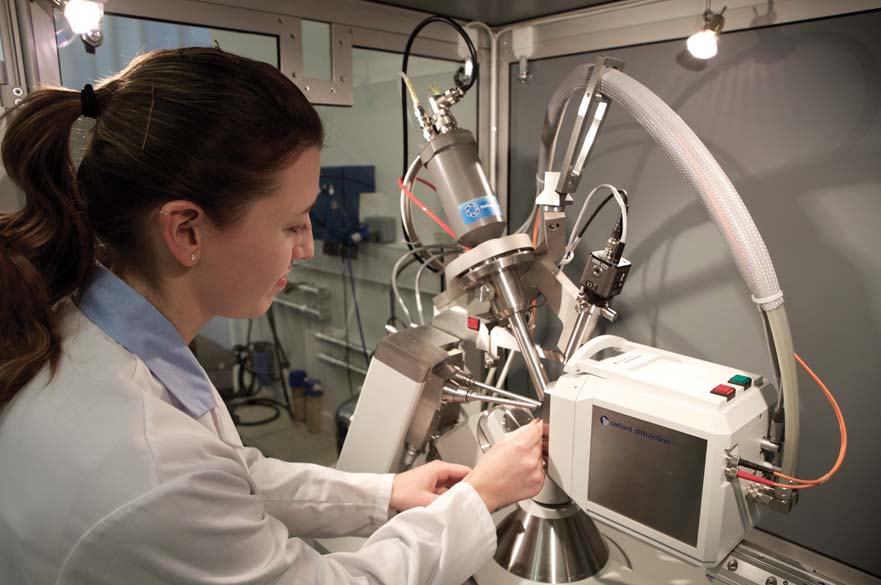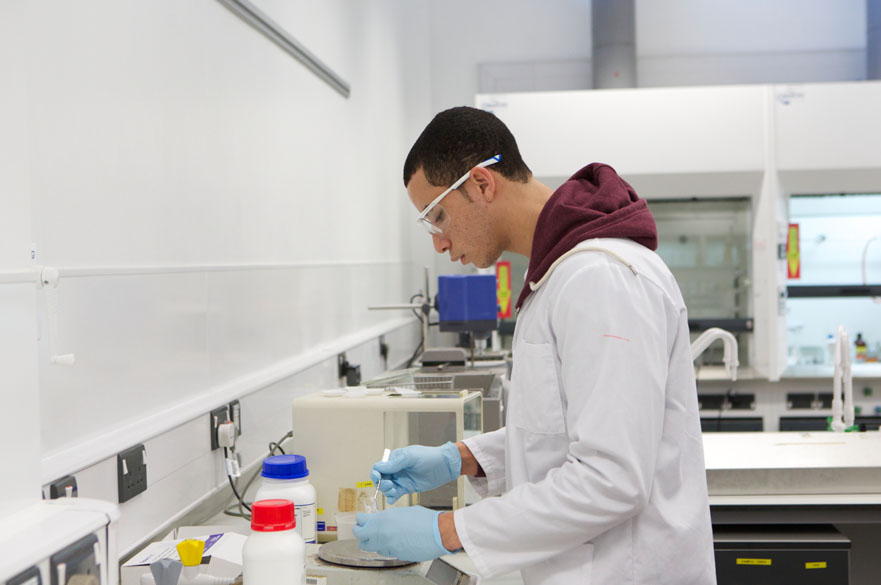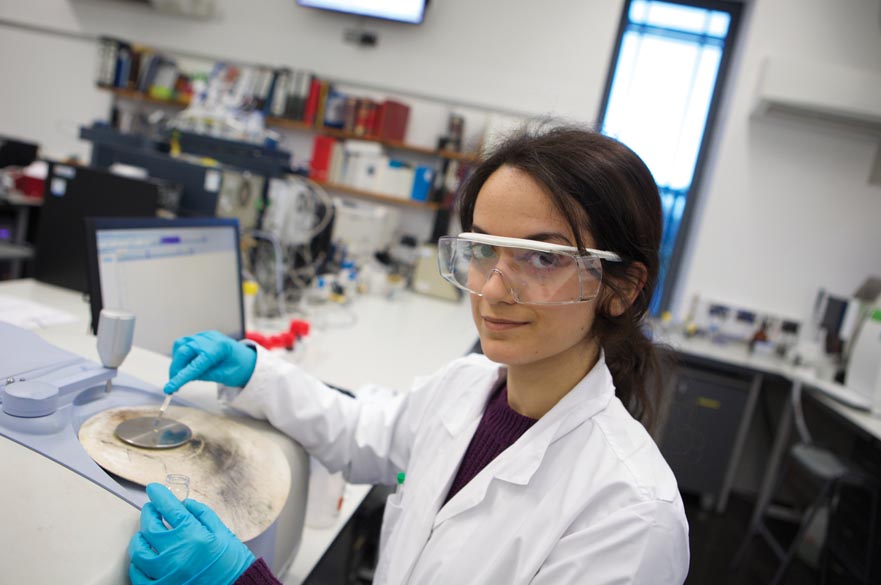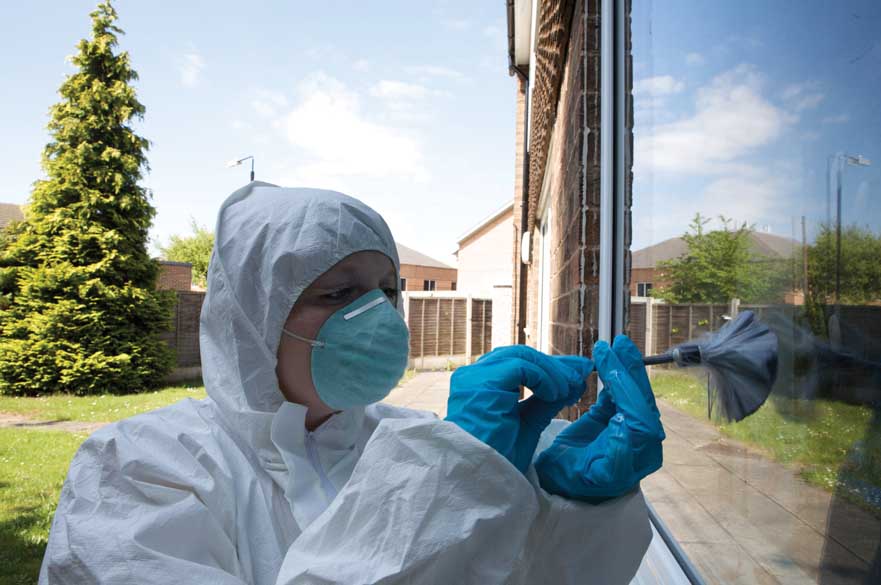Advanced Materials Chemistry MRes
About this course
This Advanced Materials Chemistry Master's course enables you to develop and further your knowledge on a range of core modules, culminating in a materials engineering-led research project within one of our diverse range of research groups.
Throughout the course, you'll study the functional roles of nanocomposites and inorganic solids, develop an understanding of the interplay between structure and observed properties, and explore investigation methods. You'll also study biomimetic and supramolecular approaches in materials chemistry.
You'll study under the Chemistry team which is comprised of academic and support staff that are subject experts in organic, inorganic, physical and analytical chemistry. Teaching and student satisfaction are very important to us and we have won awards and recognition for this aspect of our work.
Supporting you
As a postgraduate Chemistry student, you'll receive tailored support to help you develop the advanced laboratory skills needed for your research and future career.
When you choose your research project, you won’t be doing it alone. You'll work closely with your academic supervisor to identify the specific techniques and skills required for your project – whether that's analytical chemistry, synthesis, instrumentation, or something more specialised. From there, you’ll receive guidance and training to build those skills with confidence.
This personalised approach ensures you’re fully prepared to carry out your research to a high standard, while also developing practical expertise that’s highly valued in both academic and industrial settings.
What you’ll study
You will be taught three core modules and you will conduct a research project. If you are a part-time student, you will continue to study the second year from the modules listed below.
Scientists from Vectura deliver some of the module content. Other guest lecturers will also present their research to you from a variety of other companies and universities.
Gain hands-on experience.
As well as working and studying under the direction of world-leading pharmaceutical and medicinal science staff, you will gain hands-on experience in a variety of modern instrumentation including:
- multi-nuclear magnetic resonance spectrometry (NMR)
- mass spectrometry
- transmission electron microscopy (TEM)
- scanning electron microscopy (SEM)
- high-pressure liquid chromatography (HPLC)
Masters Research Conference
As a postgraduate Chemistry student, you'll have the opportunity to take your research beyond the lab and into the spotlight at our prestigious Masters Research Conference – a highlight of the course and a unique platform to present your project work.
This event isn’t just an academic showcase – it’s a professional networking opportunity. Leading employers from across the industry are invited to attend, offering you the chance to discuss your research, exchange ideas, and make valuable connections that could shape your future career.
Top industry representatives also judge the event, awarding prizes for the most innovative and impactful projects – giving you the chance to stand out and get noticed.
Whether you're looking to continue into a research role or step into industry, this event is a powerful way to build your profile, gain feedback from professionals, and start building your network before you even graduate.
Physical Properties of Solid-state and Nano-composite Materials (20 cp)
This module covers the fields of solid-state and nanocomposite materials chemistry. You'll understand the functional roles, characteristics and synthesis of nanocomposites and inorganic materials.
Inorganic Chemistry Beyond the Molecule (20 cp)
Understand the use of the biomimetic and supramolecular approaches in materials chemistry. You'll learn the importance of interfaces in structure regulation and recognition in the generation of new materials, including the recognition and incorporation of materials into the human body.
Research Methods and Independent Study (20 cp)
This module provides an underpinning in research skills relevant to independent study. You will be introduced to the techniques required to formulate a research project and carry out a literature review. You will be given practice in the use of the library and learning resources, including relevant IT packages.
Research Project (120 cp)
You will work on laboratory-based research and will evaluate and review the scientific literature relevant to the topic. You will design and conduct experimental work, and present the findings in the form of a presentation, poster, and written thesis.
Examples of project titles:
- MRI Contrast Agents
- Peptide-mineral Interactions
- Small Molecule Approaches to the Elucidation of Protein Function
- Multiplexing, Fluorescence Lifetime Imaging
- Fluorescence Microscopy
We regularly review and update our course content based on student and employer feedback, ensuring that all of our courses remain current and relevant. This may result in changes to module content or module availability in future years.
How you're taught
This programme is delivered by a combination of traditional lectures, seminars and tutorials, together with laboratory classes and laboratory-based research projects.
If you are a full-time student, you will have the opportunity to carry out a research project in a chemistry research group at Nottingham Trent University or with one of our industrial, academic or health sector partners. If you are a part-time student, you will normally conduct the research project in your own workplace.
You will be assessed on a variety of components including:
- written exam
- oral presentation
- assignment
- poster presentation
- research project.
Learn a new language
Alongside your study, you also have the opportunity to learn a new language. The University Language Programme (ULP) is available to all students and gives you the option of learning a totally new language or improving the skills you already have. Find out more about the ULP.
How you're assessed
Coursework (55%), written (30%) and practical (15%)
Contact hours
Lectures / seminars / workshops (10%) and independent study (90%)
Careers and employability
At Nottingham Trent University we know that your employability and job prospects are crucial factors in your choice of university. You need to know that your postgraduate degree will be worth the time and money you spend on it.
Our strength lies in the relevance of our degrees to the real world. In all subject areas, we encourage you to recognise your transferable skills and their application to a multitude of careers. By taking an MRes in Advanced Materials you will benefit from the progressive development of a variety of skills, such as advanced laboratory techniques and the critical analysis and synthesis of breadth and depth of relevant chemistry-specific research.
Our graduates have gone on to work in a wide variety of job markets including:
- pharmaceuticals
- petrochemicals
- polymers
- food and drinks
- liquid crystals
- advance materials engineering
- defence
- teaching
- finance and sales.
Many graduates choose to undertake further study and this course provides a good basis for you to progress onto a PhD.
Although this Advanced Materials postgraduate degree does not offer a formal placement, it is vocationally focused and benefits from strong links with industry.
Re:search Re:imagined
To us, research is about more than writing papers and proposing new ideas. By daring to think differently, we’re disrupting the research landscape and finding the answers to the questions that really matter. From conservation management to sustainable farming, we’re inspiring the brightest minds to rise up and find solutions to some of the most significant global challenges facing society.
NTU Enterprise
You'll also have the opportunity to turn your ideas into a viable business with help from NTU Enterprise, NTU's purpose-built Centre for Entrepreneurship and Enterprise, a support centre to help students create, develop and grow their own businesses.
Campus and facilities
You’ll mainly be studying in the Interdisciplinary Science and Technology Centre (ISTeC) and Rosalind Franklin Building with your own allocated fume hood and access to equipment including mass spectrometers and NMR machines.
Our first-class facilities support our high quality teaching and world-leading research across subjects and disciplines. As a Chemistry student you will have access to the:
- a modern electron microscope suite.
- gas and liquid chromatography
- mass spectroscopy
- atomic absorption spectroscopy
- structure determination including powder and single-crystal X-ray diffraction
- solution and solid-state nuclear magnetic resonance spectroscopy (NMR)
- infrared spectroscopy and UV-visible spectroscopy.
Our self-contained, community-focused Clifton Campus has been designed to keep students busy between lectures. Catch-up with your course mates in the Pavilion’s barista café and Refectory; brainstorm group presentations in chic and stylish study spaces; enjoy some proper R&R in The Point, home of our Students’ Union. The campus also hosts the multimillion-pound Clifton Sports Hub, offering great options for everyone — whatever your interests, and however competitive you’d like to get!
You’re also right next to the bright lights of Nottingham — one of Britain’s top 10 student cities, and one of Europe’s top 25. All through termtime, a dedicated on-campus bus service will get you to the heart of the action (and back) in under 25 minutes. You’ll find a city stuffed with history, culture, and well-kept secrets to discover at your leisure: enjoy lush green spaces, galleries, hidden cinemas and vintage shopping by day, and an acclaimed food, drink and social scene by night.
Take our virtual tour to get a real feel for the campus.
Entry requirements
UK students
Academic entry requirements: UK honours degree (minimum 2.2) or equivalent in a chemistry-related subject (including forensic science, pharmacology, and pharmacy, subject to an assessment of your course content by the admissions tutor).
Applicants with relevant employment experience or other relevant qualifications will also be considered.
Additional requirements for UK students
There are no additional requirements for this course.
Other qualifications and experience
We welcome applications from students with non-standard qualifications and learning backgrounds and work experience. We consider credit transfer, vocational and professional qualifications, and any work or life experience you may have.
You can view our Recognition of Prior Learning and Credit Transfer Policy which outlines the process and options available, such as recognising experiential learning and credit transfer.
Getting in touch
If you need more help or information, get in touch through our enquiry form.
International students
Academic entry requirements: 2.2 honours degree or equivalent in a relevant subject including Chemistry, Forensics, Pharmacology and Pharmacy.
Applicants with relevant employment experience or other relevant qualifications will also be considered.
We accept equivalent qualifications from all over the world. Please check your international entry requirements by country.
English language requirements: See our English language requirements page for requirements for your subject and information on alternative tests and Pre-sessional English.
Additional requirements for international students
Student visas
Following an update to the immigration rules in January 2024, if you intend to study in the UK on a Student visa, you can only bring your partner / children (‘dependants’) if you are studying one of the following:
- a PhD or other doctorate (RQF8)
- a research-based higher degree.
Please note that all of our MRes courses are classed as ‘postgraduate taught’ and therefore do not meet the requirement for you to be accompanied to the UK by your dependants.
English language requirements
View our English language requirements for all courses, including alternative English language tests and country qualifications accepted by the University.
If you need help achieving the language requirements, we offer a Pre-Sessional English for Academic Purposes course on our City campus which is an intensive preparation course for academic study at NTU.
Other qualifications and experience
We welcome applications from students with non-standard qualifications and learning backgrounds and work experience. We consider credit transfer, vocational and professional qualifications, and any work or life experience you may have.
You can view our Recognition of Prior Learning and Credit Transfer Policy which outlines the process and options available, such as recognising experiential learning and credit transfer.
Sign up for emails
Sign up to receive regular emails from the International Office. You'll hear about our news, scholarships and any upcoming events in your country with our expert regional teams.
Getting in touch
If you need advice about studying at NTU as an international student or how to apply, our international webpages are a great place to start. If you have any questions about your study options, your international qualifications, experience, grades or other results, please get in touch through our enquiry form. Our international teams are highly experienced in answering queries from students all over the world.
Policies
We strive to make our admissions procedures as fair and clear as possible. To find out more about how we make offers, visit our admissions policies page.











